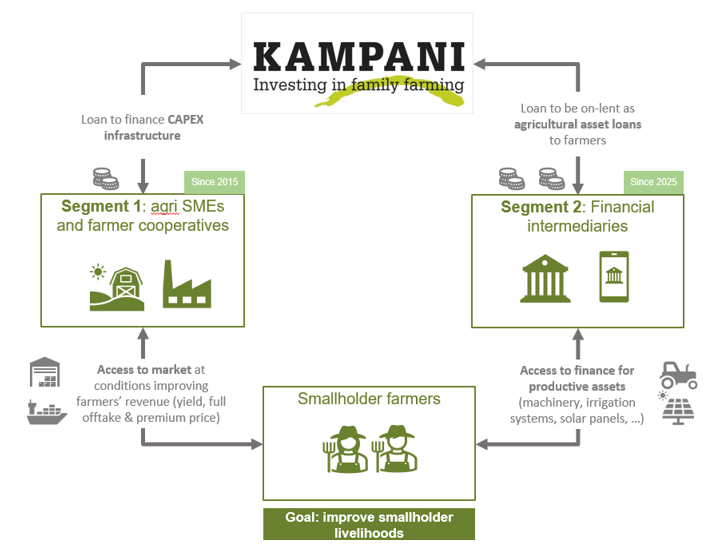Our Approach
Reducing the vulnerability of smallholder farmers: this is what Kampani strives for.
How? By providing financing solutions to producer organizations (cooperatives) and agri SMEs in developing countries, appropriate to finance long term productive assets.

The Rural Missing Middle Challenge
Kampani is a social impact investment fund designed to bridge the financing gap faced by small-scale farmers and agri-SMEs in Africa and Latin America. While these rural entrepreneurs are driving economic and social progress in their communities, they struggle to access capital beyond microloans but below industrial-scale investments—a gap known as the "missing middle in agricultural finance."

In the agri sector, SMEs and cooperatives often have long term investment needs to finance hard assets, such as processing equipment (demand). Financiers tend not to provide small investment amounts with long durations, due to high transaction cost & low risk appetite (offer). This imbalance between offer & demand is called “the missing middle”. It is the exclusive focus of Kampani.
Unlike traditional banks or microfinance institutions, Kampani offers long-term, flexible capital tailored to the needs of producer organizations. It is structured like a commercial growth fund but prioritizes social impact over financial returns. By combining the expertise of NGOs, private investors, and social lenders, Kampani ensures rigorous investment strategies while maintaining a strong development focus.
Beyond funding, Kampani actively participates in the governance of its investees, providing strategic guidance and leveraging its network to support business growth. Investments are complemented by capacity-building efforts from partner NGOs, ensuring long-term success.
Kampani is, in other words, primarily a development tool. Along with a certain financial return on investment, it aims for a high social return on investment.
"Kampani was created to address this financing gap and support agri entities to increase farmer income, better integrate them in food value chains, develop communities & improve food security."
At a glance: our two segments
Kampani has been supporting agri-SMEs & cooperatives since its creation.
Since 2025, Kampani is also supporting financial intermediaries to enable access to infrastructure at the farmer level via agri-asset loans.

1. Use of proceeds: CAPEX income-generating assets
2. Ticket size:100k to 500k € with follow-on investment capped at €1 Mn
3. Instrument: term loans & unsecured debt (no collateral)
4.Tenors: 5 to 10 years
5. Grace period: up to 2 years on principal
6. Interest rates: aligned with the impact development sector (long term)
7. 3% Signing fee, deducted from disbursement(s)
8. Governance: Active involvement in the governance of the investee
1. Use of proceeds: 100% to be channeled into an agri-asset loan
2. Ticket size: up to 1 Mn €/$, with follow-on investments depending on currency & country exposure
3. Instrument: unsecured debt (no collateral)
4. Tenors: max. 6 years
5. Grace period: max. 3 years on principal
6. Interest rates: aligned with the impact development sector (long term)
1. Track Record: > 3 years
2. Annual Sales: > 350.000$ per year
3. Profitability: net result positive
4. Use of funds: CAPEX (i.e. income generating assets to increase production or transformation activity)
5. High impact: project dedicated to increase the income of farmers > 100 farmers
6. Min. level of formalization: formalized financial statements
1. Track record: > 5 years
2. Agri- GLP: 30-50% -strong activity in rural areas with substantial agri GLP (to be maintained along the GLP growth)
3. GLP: > 5 Mn €/$ and growing
4. Agri-asset loan experience
5. Profitability trend: positive net income for the past 3 y
6. PAR 30 (incl. restructured loans): < 10%
7. Solvency (Capital Adequacy Ration): Comfortably above the legal min. threshold (i.e. Min200-500 Bps above)
